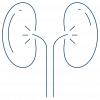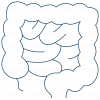What is colic?
Colic is a common condition in babies, where they cry for unexplained reasons. While the condition is associated with children, adults may experience signs of colic as well.
Colic in adults may occur when a sharp, sudden pain arises in spasms like waves, which may occur repeatedly for days, months and years.
Colic-related pain in adults is caused by the contraction of muscles around a partial or complete blockage in certain organs including the small intestine, large intestine, rectum, gallbladder, kidney or ureter.
Types of colic in adults

Biliary colic
Biliary colic occurs when gallstones, which are hardened forms of bile, block the bile valves that regulate the flow of bile from the gallbladder to the pancreas or the liver.
The primary symptom of biliary colic is a sharp, abrupt pain just under the breast bone or the centre of the abdomen.

Renal colic
Renal colic can occur when kidney or urinary stones, crystal-like calcium stones that form anywhere between the kidney and the urethra, block the urinary tract.
Apart from the pain, other symptoms of renal colic include:
- Nausea
- Vomiting
- Painful urination
- Bloody or foul-smelling urine

Intestinal colic
Intestinal colic manifests with a cramp-like pain that may occur when the gastrointestinal tract is blocked, preventing food and liquid from passing through the body.
The blockages may be caused by:
- The formation of scar tissue due to prior surgeries
- Inflammatory intestinal diseases
- Cancerous tumours
- Impacted faeces
Symptoms of intestinal colic in adults may include:
- The inability to pass bowels
- Vomiting
- A loss of appetite
- Abdominal distension
Diagnosis of colic in adults
Consult a gastrointestinal specialist if you experience any of the symptoms of biliary colic, intestinal colic or renal colic.
Your specialist may look into your medical history including prior surgeries, family medical history and previous bouts of pain.
They may also perform several tests to ascertain the cause of the pain, including a physical test that involves applying pressure to tender areas in your stomach.
In this process, you may be asked to undergo X-ray scans or other imaging tests such as CT scans and ultrasound scans.
Colic treatment
There are various treatment options available for colic, depending on what causes the pain and the severity of the condition.
You might be administered painkillers and anti-inflammatory drugs to reduce the discomfort. You may also be recommended shockwave treatment to break up the stones in your kidney or the gallbladder if the condition is more severe.
Serious cases of biliary colic might require minimally invasive surgery to remove the gallbladder, which is considered to be a non-essential organ.
FAQ
What is a colic attack in adults?
A colic attack occurs when the muscles in the gastrointestinal system contract around an obstruction. This can happen in the intestines, the gallbladder or the renal system. Colic may be painful with the pain lasting up to five hours, and even after the pain subsides, some patients may feel residual aches for up to 24 hours. These painful episodes may occur regularly if the patient does not get any treatment.
What can cause colic in adults?
Though colic in adults is relatively rare and its true cause isn’t known, there are several factors that may contribute to an adult developing colic.
- An underdeveloped digestive system
- Anxiety and stress
- Imbalance of healthy gut bacteria
- Food allergies
What does colic pain in adults feel like?
A colic pain in adults may feel like a dull ache, a cramp or a sharp pain and occurs usually after a large meal or around bedtime.
Could colic pain in adults indicate a more serious underlying medical condition?
Painful episodes caused by colic in adults may go away after a short while. Despite this, there may be some symptoms that warrant immediate medical attention.
These symptoms include:
- Yellow skin and eyes
- Rapid heartbeat
- Vomiting after eating or drinking
- Fever and chills
If you have these symptoms, your colic episodes may be caused by a more serious underlying medical condition.
How can colic in adults be prevented?
- Eat a balanced diet with lots of fibre.
- Eat less food containing sodium and fats.
- Keep your body weight as moderate as possible
Schedule an appointment with gastrointestinal specialists
The team of specialists at the Sydney Gut Clinic are trained and experienced in treating a range of gastrointestinal illnesses including colic.
Request an appointment with one of our specialists if you’ve noticed symptoms of this condition and are experiencing any pain.
Sydney Gut Clinic services are only available to patients in Australia.
